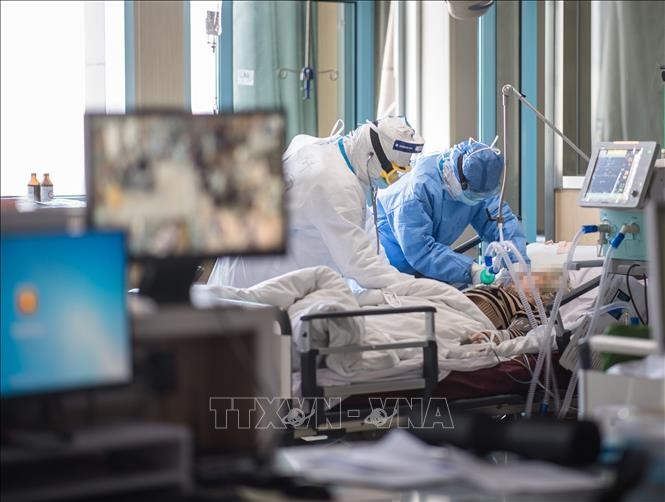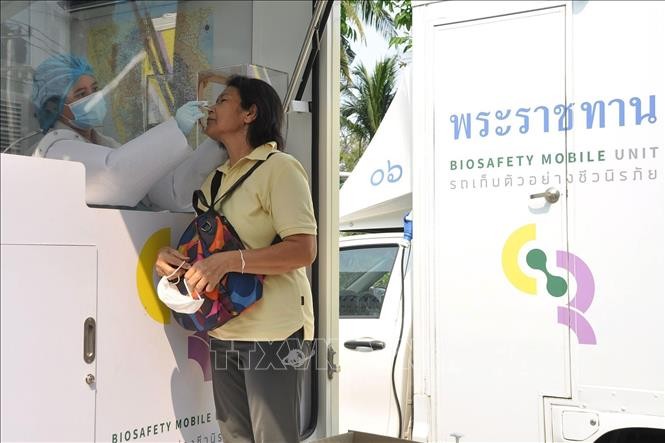
The available evidence suggests that the NB.1.8.1 variant of the SARS-CoV-2 virus is more easily transmissible and may partially evade immunity from previous COVID-19 infections or vaccinations.
The World Health Organization (WHO) has classified NB.1.8.1 as a “variant requiring monitoring” because it is circulating in many countries and spreading rapidly. Furthermore, NB.1.8.1 possesses distinct characteristics compared to previous variants.
A WHO spokesperson shared: “The SARS-CoV-2 virus continues to evolve, and from January to May, there were changes in the dynamics of SARS-CoV-2 variants globally. At the beginning of the year, the most prevalent variant WHO monitored globally was XEC, followed by KP.3.1.1. By February, XEC began to decline while LP.8.1 increased in circulation and then became the most frequently detected variant by mid-March. Since mid-April, LP.8.1 has slightly decreased in circulation while NB.1.8.1 cases have increased.”
The NB.1.8.1 variant currently accounts for over 10% of COVID-19 cases globally. According to the Independent (UK), although there is no evidence that NB.1.8.1 causes more severe symptoms, many experts believe it may be more likely to attack cells and cause gastrointestinal symptoms such as diarrhea, constipation, and nausea.
Since its initial detection in January 2025, the NB.1.8.1 variant has spread to numerous states across the United States, Australia, and Thailand, and is most prevalent in China and Hong Kong.
On May 24th, the Ho Chi Minh City Department of Health announced that recent gene sequencing analysis showed that 83% of samples from COVID-19 patients in Ho Chi Minh City were the NB.1.8.1 variant.

Like its predecessors, NB.1.8.1 also has multiple mutations in its spike protein – the part of the virus's surface that allows it to enter the human body via the ACE2 receptor, which is considered the "gateway" to cells.
A recent, yet unproven, study has put forward several hypotheses suggesting that NB.1.8.1 may be spreading more rapidly. According to The Guardian (UK), researchers using laboratory models found that NB.1.8.1 has the strongest binding affinity to the human ACE2 receptor compared to several other variants tested. This means it may be more capable of infecting cells than previous strains.
The study also examined antibody levels in people who had been vaccinated or had previously been infected with COVID-19. The results showed that the ability of antibodies to neutralize NB.1.8.1 was approximately 1.5 times lower than that of another recent variant, LP.8.1.1. This means that people infected with NB.1.8.1 are more likely to transmit the virus to others compared to previous variants.
Professor Subhash Verma at the Reno School of Medicine, University of Nevada (USA), told CBS News: "The data shows that NB.1.8.1 does not cause more severe illness than previous variants, although it may spread more easily."
Although neutralizing antibody levels may be slightly reduced in response to the NB.1.8.1 variant, the WHO states that current COVID-19 vaccines still offer protection against severe illness caused by this variant.
Source: https://baolaocai.vn/nhung-dieu-can-biet-ve-bien-the-covid-19-moi-dang-lan-manh-post402842.html



![[Live] 2025 Community Action Awards Gala](/_next/image?url=https%3A%2F%2Fvphoto.vietnam.vn%2Fthumb%2F1200x675%2Fvietnam%2Fresource%2FIMAGE%2F2025%2F12%2F16%2F1765899631650_ndo_tr_z7334013144784-9f9fe10a6d63584c85aff40f2957c250-jpg.webp&w=3840&q=75)
![[Photo] Prime Minister Pham Minh Chinh receives the Governor of Tochigi Province (Japan)](/_next/image?url=https%3A%2F%2Fvphoto.vietnam.vn%2Fthumb%2F1200x675%2Fvietnam%2Fresource%2FIMAGE%2F2025%2F12%2F16%2F1765892133176_dsc-8082-6425-jpg.webp&w=3840&q=75)
![[Image] Leaked images ahead of the 2025 Community Action Awards gala.](/_next/image?url=https%3A%2F%2Fvphoto.vietnam.vn%2Fthumb%2F1200x675%2Fvietnam%2Fresource%2FIMAGE%2F2025%2F12%2F16%2F1765882828720_ndo_br_thiet-ke-chua-co-ten-45-png.webp&w=3840&q=75)

![[Photo] Prime Minister Pham Minh Chinh receives Lao Minister of Education and Sports Thongsalith Mangnormek](/_next/image?url=https%3A%2F%2Fvphoto.vietnam.vn%2Fthumb%2F1200x675%2Fvietnam%2Fresource%2FIMAGE%2F2025%2F12%2F16%2F1765876834721_dsc-7519-jpg.webp&w=3840&q=75)

























































![[Photo] Prime Minister Pham Minh Chinh attends the Vietnam Economic Forum 2025](https://vphoto.vietnam.vn/thumb/402x226/vietnam/resource/IMAGE/2025/12/16/1765893035503_ndo_br_dsc-8043-jpg.webp)


































Comment (0)